AUGUSTA — Owners of the Sand Hill Bagel Co. hope to open next spring in the last remaining building of the former mill where a largely Franco American workforce toiled decades ago.
And the owners plan to be not just at the base of the neighborhood from which they take their name, Sand Hill, but also on the site that is now an expansive riverfront city park where Edwards Manufacturing once stood. That history will be woven into the identity of the new bagel shop, they say.
“We don’t want to be separate from Sand Hill and don’t want to be separate from Mill Park; we want to be part of that community,” said Tobias Parkhurst, co-owner of the new restaurant, with local attorney James Bass, who are also partners in two successful downtown Augusta restaurants, Cushnoc Brewing Co. and State Lunch.
“In the same way that Cushnoc and State Lunch have become woven into the fabric of downtown, we’d like to be woven into the fabric of the hill. We want to be the thing that connects the residential neighborhood of Sand Hill to the commercial area of Augusta. When we’re looking at Sand Hill, we’re looking up the hill, and hoping to have customers walking there, feeling like it is a part of their community.”
But first, they’re going to need bagels.
Sara Holt-Moseson, general manager of Sand Hill Bagel, is working on that now. Often in her own kitchen, in an apartment above State Lunch. Cooking and experimenting with recipes and potential bagel toppings is taking place there because the bagel shop’s future home not only doesn’t have a kitchen, it doesn’t have connections to either sewer or water.

Co-owners James Bass, left, and Tobias Parkhurst sample bagels Thursday in the former Edwards Mill transformer building that is being renovated to become Sand Hill Bagel Co. on Canal Street in Augusta. This is the third food business the pair is part of as they are also involved with Cushnoc Brewing Co. and State Lunch. Joe Phelan/Kennebec Journal
So Holt-Moseson, who has previously worked at a Starbucks and in business management and who wrote a food blog, moved to Augusta from Calgary, Alberta, to work as general manager of the business. She is Parkhurst’s sister-in-law.
Last week she brought samples of several different bagels she’d made, with a variety of toppings, to the bagel shop’s future home. Bass, who had not yet tried her bagels, and a handful of workers from O&P Glass tried them out, serving as taste-testers as she works on recipes and practices making the crunchy, doughy breakfast staples.

Bagels are seen during a taste test Thursday in the former Edwards Mill transformer building that is being renovated to become Sand Hill Bagels on Canal Street in Augusta. They are from bottom left, open face with nut butter with fresh raspberries, honey and salt; breakfast sandwich with pastrami, egg and cheese; and open face with cream cheese, lox, cucumber, onion and capers. Joe Phelan/Kennebec Journal
Bass and the workers from the glass company founded by Tobias Parkhurst’s father, Richard, said the bagels were great. Holt-Moseson said she thought they could have risen a little more, but they weren’t bad. She said the bagels they’ll sell will be kind of a combination of different styles, melding New York- and Montreal-style bagels into “A Maine thing,” she said. She wants their bagels to have a good crunch on the outside, to not be too dense, with air pockets in the dough and have “a little bit of chew, but not too much” to their inside.
“That is really good — it’s like dessert, for breakfast,” one of the glass workers, Nolan Brann of Augusta, said of the bagel he tried with almond butter.
Toppings included peanut butter or almond butter with smashed raspberries, sea salt and a honey drizzle, as well as lox, or salmon, and a breakfast sandwich with egg, cheese and pastrami.
The business partners bought the long-vacant building, which once served as the mill’s powerhouse, from the city for $1 in April. City officials sought to have the building redeveloped, from its most recent use as storage by the city. In 2018 the city sought proposals to redevelop the building but received no interest. So city officials expressed enthusiasm for the proposal when Bass and Parkhurst offered to redevelop the building, which was within the footprint of the city’s Mill Park, but has since been broken out of that property.

A crew from O&P Glass installs new windows Thursday in the former Edwards Mill transformer building that is being renovated to become Sand Hill Bagel Co. on Canal Street in Augusta. Joe Phelan/Kennebec Journal
Their initial proposal was for a wine bar. But their potential partner in that venture, after their acquisition of the former mill building took longer than expected, instead opened up a wine bar in Gardiner, Table Bar. So they looked at other options.
Parkhurst also said they’d been hearing comments in the community suggesting a wine bar could be the beginning of gentrification in the neighborhood, and be inaccessible to many who live there. While he denied that would have been the result, he listened to those concerns and became worried a wine bar might not get a warm welcome.
And so they came up with a new plan for a bagel shop.

“We felt a symbol of gentrification was a bad enough way to start a project,” Parkhurst told city councilors Thursday as they discussed a proposal to add parking and provide a sewer easement for the site. “We wanted something that maybe had a little more neighborhood support and felt like it was more approachable to a wider group of people. I feel confident if we do a concept that feels good to us and feels good to our neighbors, we’ll be able to be successful despite the sort of overwhelming construction costs associated with a building that’s cut off from all the utilities. What we’ve heard from the community is zero negative reaction about bagels.”
City councilors on Thursday expressed support for a proposal from the bagel shop owners for the developers to build a new, 15-spot parking lot at the site, in between the building and the rest of Mill Park which, once built, they would give back to the city. The new parking would then serve as parking for both the public using the park and customers of the bagel shop, joining the previous eight parking spots at the site.
“Thank you, again, for keeping your investments in Augusta. We absolutely love all your restaurants and look forward to your bagels,” At-Large City Councilor Heather Pouliot said, expressing support for the plan for additional parking. “I do like this solution. Let’s get it rolling.”
The developers have estimated the redevelopment will cost between $750,000 and $1.5 million. They acknowledged that kind of an investment, with only 49 seats for customers, will make it a challenge to have adequate cash flow.
They expect to employ between 12 and 25 workers, and open next spring.
The vacant building is the only structure from the former sprawling riverside Edwards Mill complex still standing, following a massive 1989 fire that destroyed the rest of the historic structures. The two story, 30-by-60-foot brick building was built between 1910 and 1920 to house transformers that used electricity from the dam to power the mill.

Sandra Holt-Moseson, left, talks with Tobias Parkhurst and O&P Glass workers Thursday about their taste test opinions of sample bagels and toppings. The sampling session was held in the former Edwards Mill transformer building that is being renovated to become Sand Hill Bagel Co. on Canal Street in Augusta. Joe Phelan/Kennebec Journal
Construction is underway now, with new glass filling previously bricked-over windows to improve the view and bring light into the long-vacant building.
As a bagel shop, it is expected to have seating for 49 inside, most of it on the second floor, and a few tables outside to accommodate another 20 to 30 for outdoor dining.
Send questions/comments to the editors.




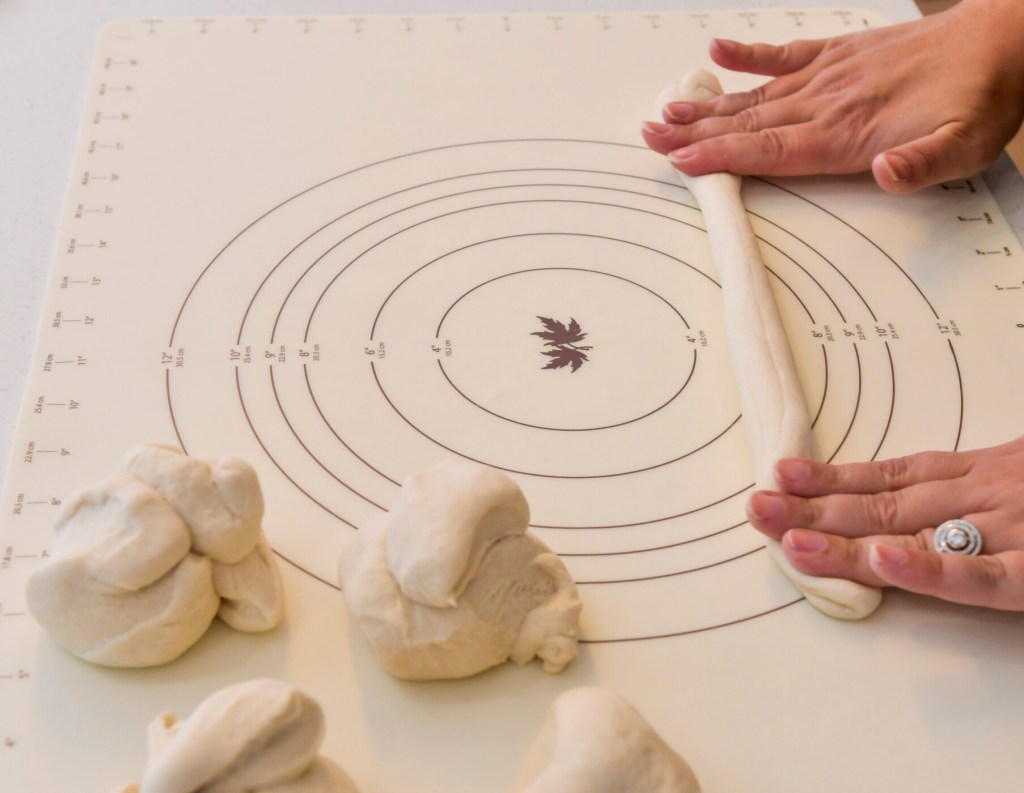


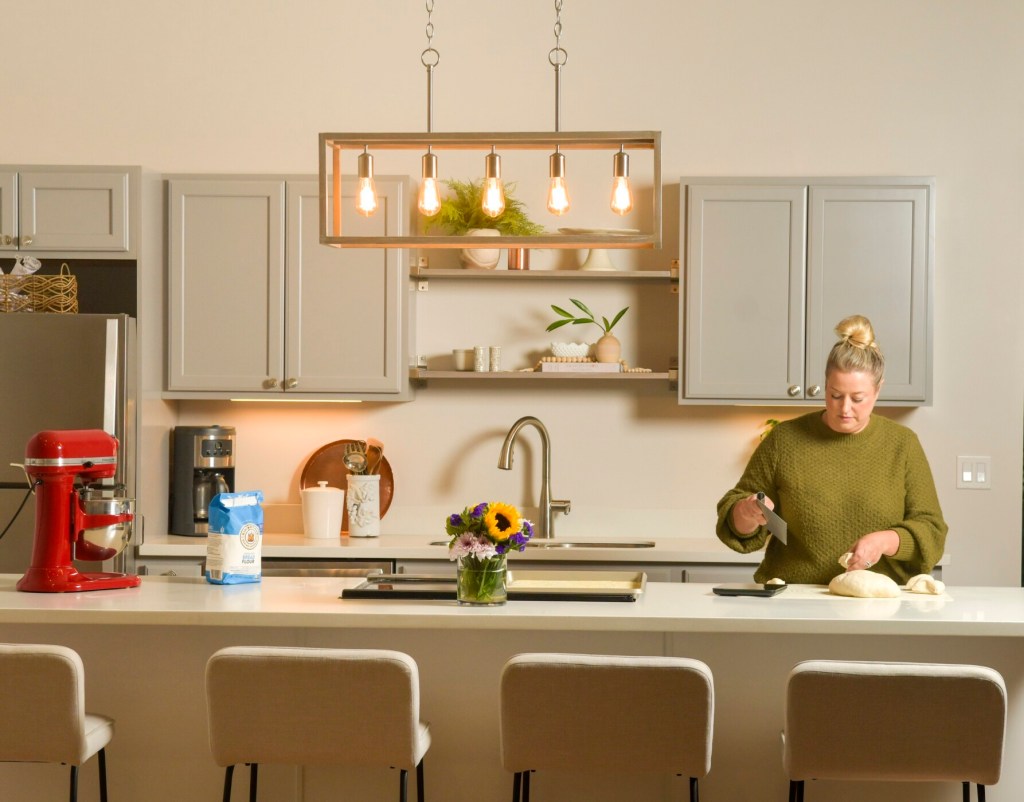

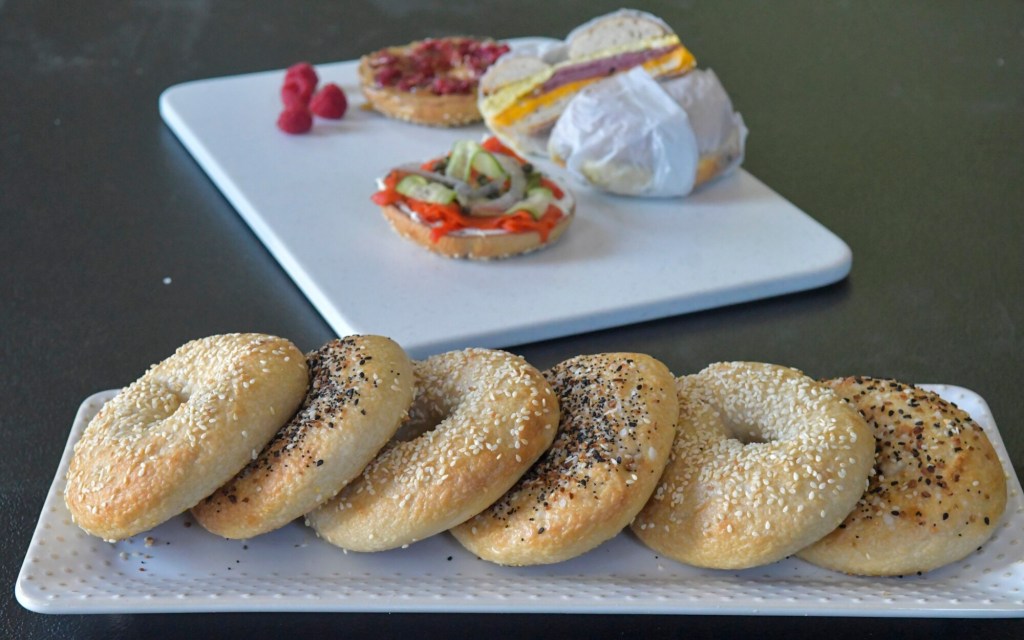
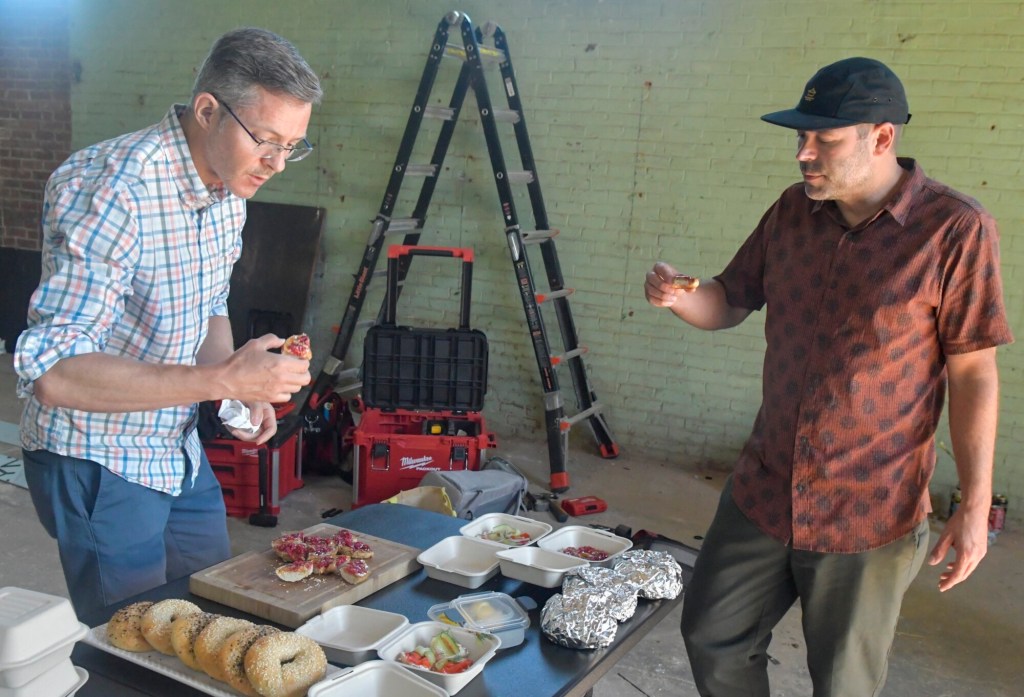

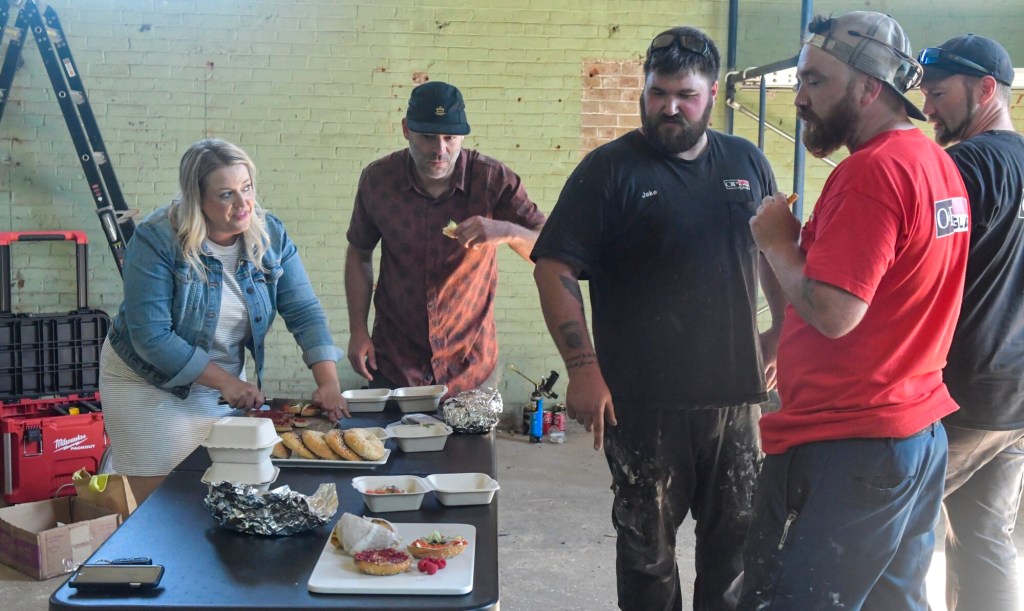

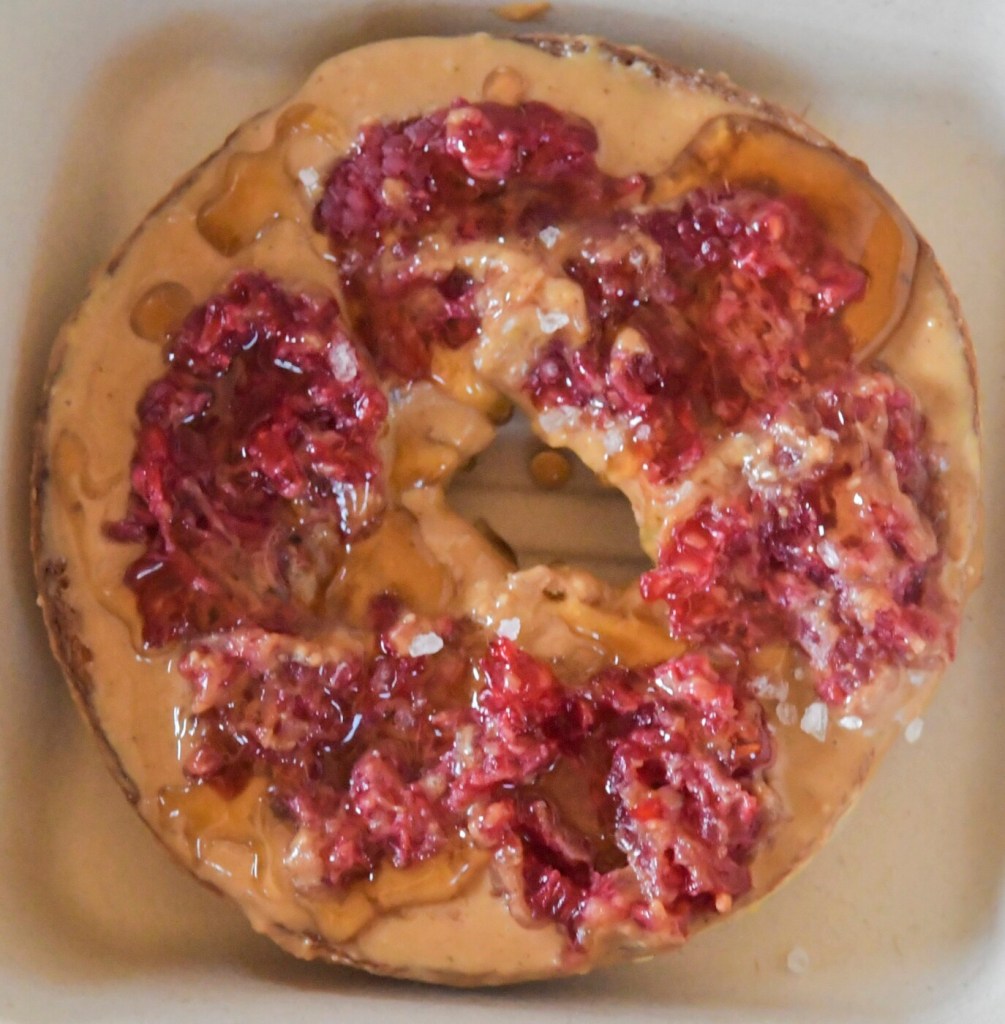

Success. Please wait for the page to reload. If the page does not reload within 5 seconds, please refresh the page.
Enter your email and password to access comments.
Hi, to comment on stories you must . This profile is in addition to your subscription and website login.
Already have a commenting profile? .
Invalid username/password.
Please check your email to confirm and complete your registration.
Only subscribers are eligible to post comments. Please subscribe or login first for digital access. Here’s why.
Use the form below to reset your password. When you've submitted your account email, we will send an email with a reset code.